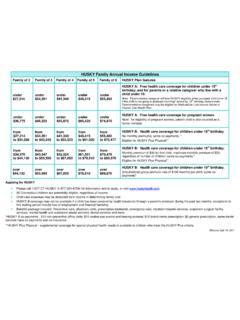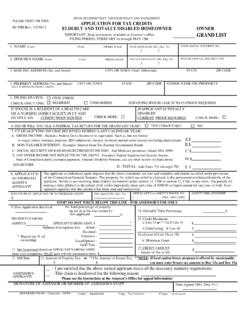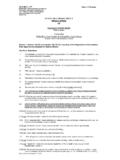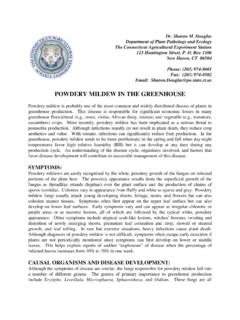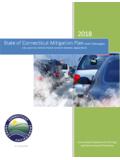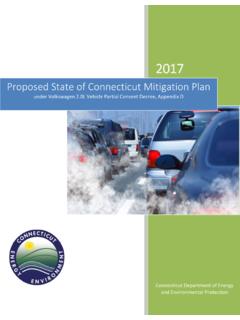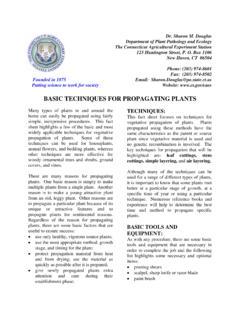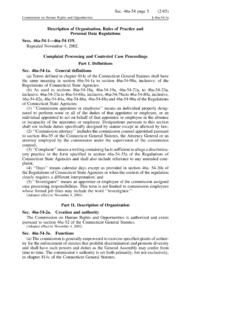Transcription of CONCEPTS OF RECOVERY IN BEHAVIORAL HEALTH: …
1 DRAFT CONCEPTS OF RECOVERY IN BEHAVIORAL HEALTH: HISTORY, REVIEW OF THE EVIDENCE, AND CRITIQUE Larry Davidson, , Maria J. O connell , , Martha Staeheli, Richard Weingarten, , , Janis Tondora, , and Arthur C. Evans, Department of Psychiatry, Yale University School of Medicine and the Connecticut Department of Mental Health and Addiction Services CONCEPTS of RECOVERY in BEHAVIORAL Health: History, Review of the Evidence, and Critique It has been difficult to reach consensus on any specific component of the concept of RECOVERY currently being bandied about in the BEHAVIORAL health field, with one possible exception.
2 It does seem possible to agree on the fact that the concept of RECOVERY has become the focus of a considerable amount of confusion, dialogue, and debate within the substance abuse and mental health communities over the last decade. In the following, we attempt to identify and clarify some of the sources of these confusions in order to arrive at a broad and inclusive, yet useful, understanding of RECOVERY to inform future policy and program development for DMHAS. Background: It is useful to note, for example, that one source of the current confusion may stem from the fact that the same term , RECOVERY is used in a number of different arenas in which it plays, by necessity, a number of different roles.
3 As Jacobson and Greenley noted in their recent review of the RECOVERY literature, seldom does the same word surface so frequently across the separate domains of social policy, outcomes research, services design and provision, system reform and advocacy, and personal narratives. As they describe: RECOVERY is variously described as something that individuals experience, that services promote, and that systems facilitate, yet the specifics of exactly what is to be experienced, promoted, or facilitated and how are often not well understood either by the consumers who are expected to recover or by the professionals and policy makers who are expected to help them (2001, p.)
4 482). 2In order to begin to address the ambiguity and uncertainty surrounding notions of RECOVERY in BEHAVIORAL health, we turned first to the dictionary. A cursory review of the entry for RECOVERY suggests another potential source of the confusions concerning the term, given that Webster offers the following four different definitions: 1. A return to a normal condition; 2. An act, instance, process, or period of recovering; 3. Something gained or restored in recovering; and 4. The act of obtaining usuable substances from unusuable sources, as with waste material.
5 Without forcing square pegs into round holes, we suggest that these four definitions can be useful in clarifying the different senses of RECOVERY currently being used within the BEHAVIORAL health field in relation both to psychiatric and substance use disorders and across the domains described above. In the following, we examine these definitions of the term RECOVERY and argue that each term is most appropriate to one condition as opposed to the others from among the four categories of: 1. acute physical conditions; 2. trauma, its sequelae, and related post-traumatic stress disorders; 3.
6 Substance use disorders; and 4. severe psychiatric disorders. In closing, we recommend the adoption of a broad definition of RECOVERY that allows for all four variants to co-exist and/or interact within the context a given individual s life, encouraging an appreciation of the different ways in which individuals manage to live with, and despite, various combinations of BEHAVIORAL health conditions and concerns. 1. Physical RECOVERY : Return to a normal condition. This definition of RECOVERY represents by far the most common use of the term, and a use of the term that is perfectly appropriate when referring to the resolution of acute physical illnesses and conditions such as a cold, the flu, or a broken bone.
7 In all of these cases, RECOVERY is taken to mean that the person has been restored, through whatever means, to the same presumably normal condition she or he had prior to the 3onset of the illness or the precipitating event that led to the condition ( , skiing accident). In all of these cases, there also is an assumption that a healthy, normal state existed prior to the onset of disease and/or dysfunction; , that people are naturally healthy until something happens to deprive them of their health, RECOVERY then being restoration of the person to this prior state.
8 Although these assumptions might be questioned, this definition represents a relatively well-accepted use of the term RECOVERY and one that is not a source of contention or debate within physical medicine when applied to acute conditions that leave people in relatively the same state they were in when they first experienced the condition. RECOVERY takes on a different meaning, however, even within physical medicine when applied to chronic physical health conditions such as asthma, diabetes, or cancer. In these cases, the person is not expected to be restored to a previous, pre-morbid, condition of health.
9 To the degree that the term RECOVERY is used at all in relation to these more prolonged conditions ( , partial RECOVERY from a stroke, being in RECOVERY from cancer), it ordinarily is taken to mean a partial return to normal functioning or to incorporate one of the different meanings described below and no longer refers to restoration to a previous condition of normality. We suggest, likewise, that a considerable amount of the controversy within BEHAVIORAL health in relation to the term RECOVERY stems from a misuse of this meaning of the term to apply to other non-acute conditions such as severe psychiatric and substance use disorders.
10 Were this first definition of restoration to a normal state following an acute illness or episode the only legitimate meaning of RECOVERY , then the term could be dismissed as irrelevant or inappropriate for many cases of severe psychiatric and/or substance use disorders; a majority of which are prolonged conditions. 2. Trauma RECOVERY : An act or process of recovering. Aside from its common uses in physical medicine in relation to definition #1 above ( , as in a RECOVERY room being a place where you 4recover from the immediate effects of surgery), this second definition of RECOVERY primarily has been commandeered for political and clinical purposes by victims of interpersonal trauma and the people who work with, support, or advocate for, them.
